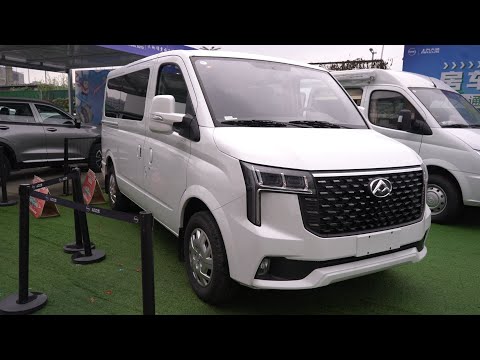Maxus EV80 Pro Video Review
Maxus EV80 Pro Electric Vehicle
Overview of the Maxus EV80 Pro Design
The SAIC Maxus EV80 Pro, a pure electric vehicle, flaunts a closed front design reminiscent of the New Journey V70. Expect this sleek and efficient design to become a staple in commercial electric vehicles. Boasting dimensions of 5774 mm in length, 1998 mm in width, and 2365 mm in height, it stands out as a logistical powerhouse.
What is the Maxus EV80 Pro?
The Maxus EV80 Pro steps onto the electric logistics scene with muscle and smart design. Launched by SAIC’s Maxus brand, this full-size electric van aims to meet the heavy-duty needs of urban and suburban businesses. Priced from about $40,000 (€37,300/£32,000) and offering a 305 km (190-mile) WLTP range, the EV80 Pro serves fleet managers who need reliable, emission-free workhorses that don’t bust the budget. With flexible configurations and a focus on cargo practicality, it’s a serious rival to European staples like the Mercedes-Benz eSprinter and Nissan e-NV200.
Electric Cargo Van: Design Focused on Practicality
Stretching 5,774 mm (227 inches) in length and standing 2,365 mm (93 inches) tall, the Maxus EV80 Pro doesn’t try to hide its commercial DNA. A closed front grille with sleek LED headlights shouts "electric" without overcomplicating the look. A wide 1,295 mm (51 inches) sliding side door and boxy, flat load space mean it’s optimized for work, not frills. Euro pallets fit easily on the flat cargo floor, and its configurable layouts—from high-roof vans to wheelchair-accessible models—ensure it can be customized to a wide range of industry needs.
Maxus EV80 Pro Range and Charging Performance
Under the hood—or more accurately, under the cargo bay—the Maxus EV80 Pro houses a 77 kWh lithium iron phosphate battery. That setup delivers a real-world range around 305 km (190 miles) per WLTP tests, putting it ahead of the Mercedes eSprinter (150 km/93 miles) and Renault Kangoo Z.E. (270 km/168 miles). Need a fast turnaround? The 80 kW DC fast charger gets the van from 20% to 80% in roughly 43 minutes. An AC charge at 7.2 kW overnight takes about 8.5 hours—ideal for fleets topping off between shifts.
Affordable Electric Vans 2025: Competitive Pricing and Cargo Capacity
Priced from $40,000 (€37,300/£32,000) and reaching up to $50,000 (€46,600/£40,000) depending on spec, the Maxus EV80 Pro punches far above its weight. Standard models deliver 10.2 m³ (360 cubic feet) of cargo space, expanding to 11 m³ (389 cubic feet) in high-roof versions. Payload peaks at 1,350 kg (2,976 pounds), meaning it can rival—and often beat—conventional diesel vans of similar size. The van’s real value lies in combining large cargo volume, low emissions, and lower operating costs without the premium price tag usually demanded by its German rivals.
Maxus EV80 Pro Specs: Interior Comfort Meets Practical Workspaces
Inside, the Maxus EV80 Pro offers no-nonsense functionality. Three seats up front, rubber floor mats, and durable trim pieces mean it’s built to survive daily fleet life. A central display manages battery and range info, while fleet telematics integration is available for operators needing remote monitoring. While the cabin skips luxury finishes, the multifunction steering wheel, heated mirrors, air conditioning, and wide-opening cargo bay doors make it a workmate drivers won't mind spending hours in. Storage could be better, but the essentials are covered where it counts.
Maxus Electric Van Safety and Versatility
The Maxus EV80 Pro brings solid safety credentials to the jobsite. Standard features include ABS, electronic brake force distribution, hill hold assist, and dual airbags. LED daytime running lights keep visibility sharp, while rear parking sensors and a reversing camera ease the urban squeeze. Fleet-focused variants can add adaptive cruise control and lane-keeping assist, although availability may vary regionally. The reinforced steel safety cage also earns the van credibility for collision protection, essential for fleets operating in crowded metro zones.
Best Electric Vans for Logistics: Real-World Usability
The Maxus EV80 Pro thrives in the real world, not just spec sheets. Urban couriers, grocery haulers, and tradespeople can count on its range, rapid recharge times, and generous cargo handling to get through grueling daily schedules. Wheelchair-accessible models developed with AMF-Bruns expand its appeal into public sector and health mobility sectors. Plus, a 750 kg (1,653-pound) towing capacity for chassis-cab versions means even heavy gear can come along. While the infotainment could use an upgrade, everything else about the EV80 Pro screams efficiency, durability, and business sense.
Conclusion
Pros and Cons of the Maxus EV80 Pro
- Pros:
- Strong 305 km real-world range with rapid charging
- Spacious 10.2–11 m³ cargo capacity with flexible layouts
- Competitive starting price compared to premium rivals
- Robust standard safety features including reversing camera
- Multiple variants for specialized applications
- Cons:
- Cabin design focuses more on durability than luxury
- Infotainment system feels dated compared to newer competitors
- ADAS availability varies by market
- No all-wheel-drive option for slippery conditions
- Battery warranty mileage limit could be more generous
Final thoughts
The Maxus EV80 Pro proves you don’t need to splash out for a German badge to get serious electric van capability. With impressive range, massive cargo space, and competitive pricing, it’s tailor-made for businesses ready to future-proof their operations and cut costs without cutting corners. For forward-thinking fleets, it’s a smart bet with a strong return.








